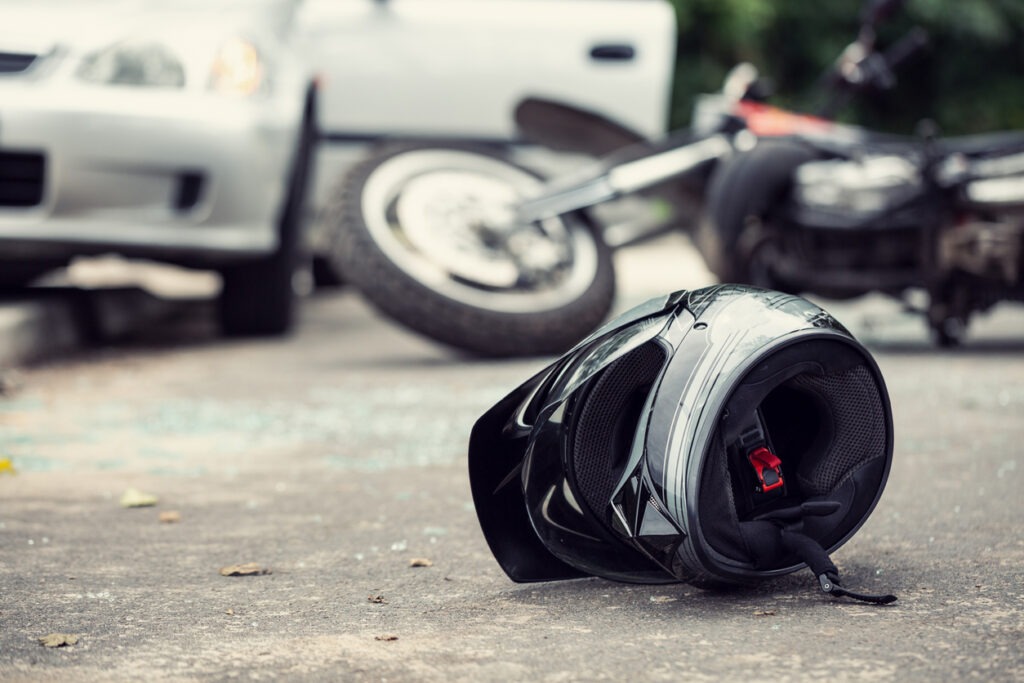
When pursuing a personal injury car accident claim, it’s crucial to prove the at-fault party’s negligence. If no negligence was involved in your accident, it could mean you don’t have a case. To understand how you should react after a motorcycle accident, how to prove negligence and more, continue reading our article.
What Should I Do Following a Motorcycle Accident?
Following any type of motorcycle accident, there are certain steps you should follow to ensure your safety and to help ensure a successful claim:
- Call 911: Requesting a police response will create an accident report that is necessary as an official document recording the accident. Additionally, medical services will also be available for any party involved.
- Gather evidence: Be sure to photograph all vehicle damage, property damage, road conditions and road signs. When possible, document the contact and insurance information of other drivers involved, as well as the contact information of any eyewitnesses.
- Avoid admitting fault: Even the most insincere apology may be used against you as an admission of guilt. While extending sympathies and concerns for others impacted is acceptable, be careful to avoid any statement that may be misconstrued as accepting responsibility for the accident.
- Contact an attorney: A motorcycle accident attorney will be able to assist you in every step of this process. Contacting an attorney at our firm early in this process is the best way to ensure a successful outcome.
How Is Negligence Decided in a Motorcycle Accident Case?
The State of California bases personal injury claims on the legal principle of negligence. Negligence refers to the failure of a driver to use reasonable care to prevent harm or injury to another person. This principle requires four basic elements to be proven for negligence to be determined:
- Duty of care: To prove a duty of care, you must prove that the offending driver had an obligation to act responsibly in a manner that does not harm other motorists. In some cases, establishing a duty of care is as simple as stating the motorist was responsible for obeying traffic laws and driving safely.
- Breach of duty: After a duty of care has been established, you must prove that a breach of that duty occurred and the actions deviated from what a reasonable driver should have done in that situation. Factors considered when determining a breach of duty include traffic laws, prevailing road conditions and the attentiveness of the driver.
- Causation: Proving causation involves establishing a link between the breach of duty and the resulting damages. This can be done with evidence gathered from the accident scene, such as photographs of damage, medical reports or eyewitness testimony.
- Damages: Damages refer to any losses incurred due to the negligence of the driver. This may include medical expenses, property damage, lost wages, pain, suffering and emotional distress.
Negligence Per Se
Negligence per se is an abridged version of the negligence principle that applies when a driver breaks a traffic law that was intended to protect the safety of other road users. According to California law, the driver is presumed to have had a duty of care to follow the law and, therefore, breached said duty when the law was broken. As a result, only the last two elements of the negligence principle are required to be proven.
What is Pure Comparative Negligence?
The State of California recognizes pure comparative negligence, meaning the state court will allow an injured party to collect damages even if that person is 99% at fault for the resulting accident. However, a court will reduce the award based on the percentage of fault. For example, if a driver is found to be 20% at fault for an accident, then the driver would receive $80,000 of a $100,000 verdict.
What Are Common Examples of Negligence in Motorcycle Accidents?
Any motorist on the road can be guilty of negligence. A few common forms that tend to affect motorcyclists are:
- Texting while driving or other distractions
- Driving under the influence of drugs or alcohol
- Road rage, aggressive driving or other reckless behavior
- Traffic law violations such as speeding, tailgating, etc.
- Fatigued driving
- Illegal turns or lane changes
- Failure to see other motorists
Who Is Responsible for Accidents Resulting From Unsafe Road Conditions?
Road conditions present unique hazards to motorcyclists that may be minor to other motorists. Suppose a property owner or city government has failed to maintain road conditions, such as loose gravel, cracked cement, potholes, uneven sidewalks, or broken asphalt. In that case, they may be held liable for any resulting damages.
- Premises liability: California’s premises liability law requires all property owners to prevent reasonably foreseeable harms that may occur to others based on the conditions of their property. Property owners are accountable for maintaining and inspecting the property, repairing potentially dangerous conditions, and giving proper warning of uncorrected dangerous conditions when necessary.
- Proving liability: Proving that damages occurred because of a property owner failing to maintain a road requires establishing who owned or controlled the property, that the property was in a dangerous condition when the accident occurred, that the dangerous condition created a reasonably foreseeable risk of injury, that the owner was aware of the condition with adequate time to repair it, that damages occurred, and that the dangerous condition was a contributing factor in causing those damages.
What Damages Are Available in a Motorcycle Accident Case?
Damages awarded in motorcycle accident cases will vary based on the circumstances and the severity of the harm involved. The following damages are possible awards available to compensate for injuries and losses:
- Medical costs
- Loss of earnings or wages
- Loss of earning capacity
- Pain and suffering
- Loss of consortium
- Punitive damages
Do I Need an Attorney?
If you or your loved one have been injured in a motorcycle accident, call us today or fill out a contact form for a free consultation.

